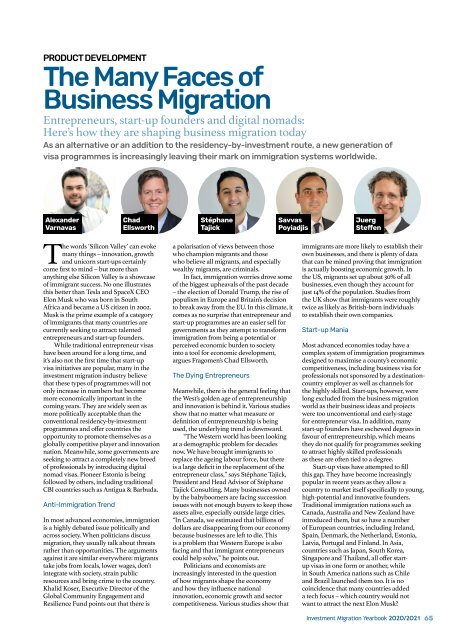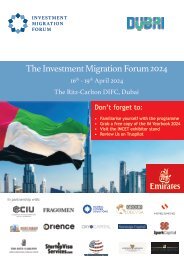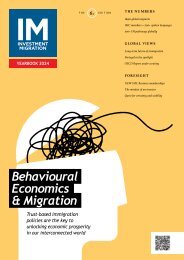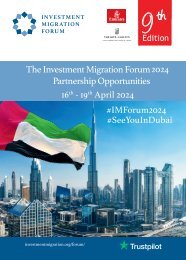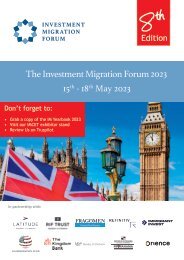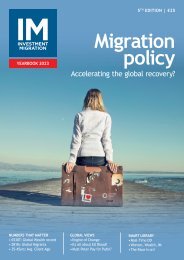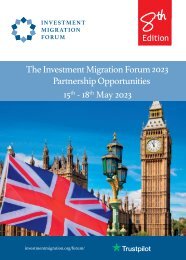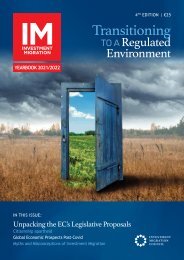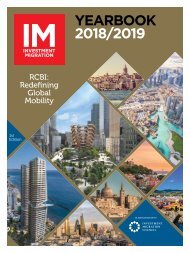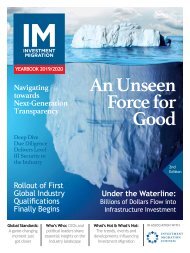IM Yearbook 2020/21
Born from the need for a global, credible, “go-to” publication, the 3rd IM Yearbook offers valuable access to a prime target audience of top industry influencers, decision makers, and the foremost referral network to the world’s most influential Investment Migration programmes: Government officials such as Heads of CIU’s, policy makers, academics, migration agents, law firms, wealth managers, financial advisors, real estate developers, and international firms involved in investment migration.
Born from the need for a global, credible, “go-to” publication, the 3rd IM Yearbook offers valuable access to a prime target audience of top industry influencers, decision makers, and the foremost referral network to the world’s most influential Investment Migration programmes: Government officials such as Heads of CIU’s, policy makers, academics, migration agents, law firms, wealth managers, financial advisors, real estate developers, and international firms involved in investment migration.
Create successful ePaper yourself
Turn your PDF publications into a flip-book with our unique Google optimized e-Paper software.
PRODUCT DEVELOPMENT<br />
The Many Faces of<br />
Business Migration<br />
Entrepreneurs, start-up founders and digital nomads:<br />
Here’s how they are shaping business migration today<br />
As an alternative or an addition to the residency-by-investment route, a new generation of<br />
visa programmes is increasingly leaving their mark on immigration systems worldwide.<br />
Alexander<br />
Varnavas<br />
Chad<br />
Ellsworth<br />
Stéphane<br />
Tajick<br />
Savvas<br />
Poyiadjis<br />
Juerg<br />
Steffen<br />
The words ‘Silicon Valley’ can evoke<br />
many things – innovation, growth<br />
and unicorn start-ups certainly<br />
come first to mind – but more than<br />
anything else Silicon Valley is a showcase<br />
of immigrant success. No one illustrates<br />
this better than Tesla and SpaceX CEO<br />
Elon Musk who was born in South<br />
Africa and became a US citizen in 2002.<br />
Musk is the prime example of a category<br />
of immigrants that many countries are<br />
currently seeking to attract: talented<br />
entrepreneurs and start-up founders.<br />
While traditional entrepreneur visas<br />
have been around for a long time, and<br />
it’s also not the first time that start-up<br />
visa initiatives are popular, many in the<br />
investment migration industry believe<br />
that these types of programmes will not<br />
only increase in numbers but become<br />
more economically important in the<br />
coming years. They are widely seen as<br />
more politically acceptable than the<br />
conventional residency-by-investment<br />
programmes and offer countries the<br />
opportunity to promote themselves as a<br />
globally competitive player and innovation<br />
nation. Meanwhile, some governments are<br />
seeking to attract a completely new breed<br />
of professionals by introducing digital<br />
nomad visas. Pioneer Estonia is being<br />
followed by others, including traditional<br />
CBI countries such as Antigua & Barbuda.<br />
Anti-Immigration Trend<br />
In most advanced economies, immigration<br />
is a highly debated issue politically and<br />
across society. When politicians discuss<br />
migration, they usually talk about threats<br />
rather than opportunities. The arguments<br />
against it are similar everywhere: migrants<br />
take jobs from locals, lower wages, don’t<br />
integrate with society, strain public<br />
resources and bring crime to the country.<br />
Khalid Koser, Executive Director of the<br />
Global Community Engagement and<br />
Resilience Fund points out that there is<br />
a polarisation of views between those<br />
who champion migrants and those<br />
who believe all migrants, and especially<br />
wealthy migrants, are criminals.<br />
In fact, immigration worries drove some<br />
of the biggest upheavals of the past decade<br />
– the election of Donald Trump, the rise of<br />
populism in Europe and Britain’s decision<br />
to break away from the EU. In this climate, it<br />
comes as no surprise that entrepreneur and<br />
start-up programmes are an easier sell for<br />
governments as they attempt to transform<br />
immigration from being a potential or<br />
perceived economic burden to society<br />
into a tool for economic development,<br />
argues Fragomen’s Chad Ellsworth.<br />
The Dying Entrepreneurs<br />
Meanwhile, there is the general feeling that<br />
the West’s golden age of entrepreneurship<br />
and innovation is behind it. Various studies<br />
show that no matter what measure or<br />
definition of entrepreneurship is being<br />
used, the underlying trend is downward.<br />
“The Western world has been looking<br />
at a demographic problem for decades<br />
now. We have brought immigrants to<br />
replace the ageing labour force, but there<br />
is a large deficit in the replacement of the<br />
entrepreneur class,” says Stéphane Tajick,<br />
President and Head Advisor of Stéphane<br />
Tajick Consulting. Many businesses owned<br />
by the babyboomers are facing succession<br />
issues with not enough buyers to keep those<br />
assets alive, especially outside large cities.<br />
“In Canada, we estimated that billions of<br />
dollars are disappearing from our economy<br />
because businesses are left to die. This<br />
is a problem that Western Europe is also<br />
facing and that immigrant entrepreneurs<br />
could help solve,” he points out.<br />
Politicians and economists are<br />
increasingly interested in the question<br />
of how migrants shape the economy<br />
and how they influence national<br />
innovation, economic growth and sector<br />
competitiveness. Various studies show that<br />
immigrants are more likely to establish their<br />
own businesses, and there is plenty of data<br />
that can be mined proving that immigration<br />
is actually boosting economic growth. In<br />
the US, migrants set up about 30% of all<br />
businesses, even though they account for<br />
just 14% of the population. Studies from<br />
the UK show that immigrants were roughly<br />
twice as likely as British-born individuals<br />
to establish their own companies.<br />
Start-up Mania<br />
Most advanced economies today have a<br />
complex system of immigration programmes<br />
designed to maximise a county’s economic<br />
competitiveness, including business visa for<br />
professionals not sponsored by a destinationcountry<br />
employer as well as channels for<br />
the highly skilled. Start-ups, however, were<br />
long excluded from the business migration<br />
world as their business ideas and projects<br />
were too unconventional and early-stage<br />
for entrepreneur visa. In addition, many<br />
start-up founders have eschewed degrees in<br />
favour of entrepreneurship, which means<br />
they do not qualify for programmes seeking<br />
to attract highly skilled professionals<br />
as these are often tied to a degree.<br />
Start-up visas have attempted to fill<br />
this gap. They have become increasingly<br />
popular in recent years as they allow a<br />
country to market itself specifically to young,<br />
high-potential and innovative founders.<br />
Traditional immigration nations such as<br />
Canada, Australia and New Zealand have<br />
introduced them, but so have a number<br />
of European countries, including Ireland,<br />
Spain, Denmark, the Netherland, Estonia,<br />
Latvia, Portugal and Finland. In Asia,<br />
countries such as Japan, South Korea,<br />
Singapore and Thailand, all offer startup<br />
visas in one form or another, while<br />
in South America nations such as Chile<br />
and Brazil launched them too. It is no<br />
coincidence that many countries added<br />
a tech focus – which country would not<br />
want to attract the next Elon Musk?<br />
Investment Migration <strong>Yearbook</strong> 2O2O/2O<strong>21</strong> 65


